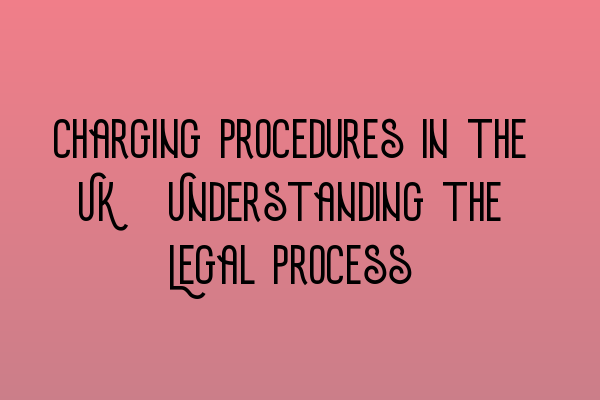Charging Procedures in the UK: Understanding the Legal Process
As criminal solicitors at SQE Criminal Law & Practice Law UK, we understand the importance of having a clear understanding of the charging procedures in the UK. In this blog post, we will provide you with a comprehensive overview of the legal process involved in charging individuals with criminal offenses.
1. Arrest and Detention
The charging process typically begins with an arrest and detention. When someone is arrested, they are taken to a police station for questioning. During this period, the police gather evidence and determine if there are sufficient grounds to charge the individual with a criminal offense.
2. Gathering Evidence
Once an individual is arrested, the police will begin gathering evidence to support the potential charges. This may involve conducting interviews, obtaining witness statements, collecting CCTV footage, and other forms of evidence gathering. The strength of the evidence will play a crucial role in determining whether charges are brought against the individual.
3. Charging Decision
After the police have gathered sufficient evidence, they will present the case to the Crown Prosecution Service (CPS) for a charging decision. The CPS will review the evidence and determine whether there is a realistic prospect of conviction and if it is in the public interest to proceed with the charges. The decision to charge or not charge an individual is based on the legal principles set out in the Code for Crown Prosecutors.
4. Court Appearance
If the CPS decides to charge an individual, they will be required to appear in court. The court appearance is known as the first hearing, where the charges will be formally read out, and the individual will have the opportunity to enter a plea. Depending on the seriousness of the offense, the case may be heard in either the Magistrates’ Court or the Crown Court.
5. Bail or Remand
Following the court appearance, the individual may be granted bail or remanded into custody. Bail allows the individual to be released from custody pending the trial, while remand involves being held in custody until the trial takes place. The decision between bail and remand depends on the circumstances of the case and factors such as the likelihood of the individual failing to appear in court or committing further offenses.
6. Pre-Trial Process
Once the charges have been laid and the individual’s bail or remand status determined, the case enters the pre-trial process. This involves several stages, including case management hearings, disclosure of evidence to the defense, and potential negotiations between the prosecution and defense in an attempt to reach a resolution without going to trial.
7. Trial
If the case does proceed to trial, it will be heard before a judge and jury in the Crown Court. The trial will involve the presentation of evidence, witness testimonies, cross-examinations, and closing arguments. The jury will then deliberate and deliver a verdict of guilty or not guilty.
8. Sentencing
If the defendant is found guilty, the next stage is sentencing. The judge will consider various factors, including the seriousness of the offense, any aggravating or mitigating circumstances, and the defendant’s past criminal history. The judge will then determine an appropriate sentence, which may range from fines and community orders to imprisonment.
Conclusion
Understanding the charging procedures in the UK is vital for those involved in criminal law. From the initial arrest to the final sentencing, each step in the process plays a crucial role in the administration of justice. If you are interested in further exploring criminal law and practice in the UK, we recommend checking out our related articles:
